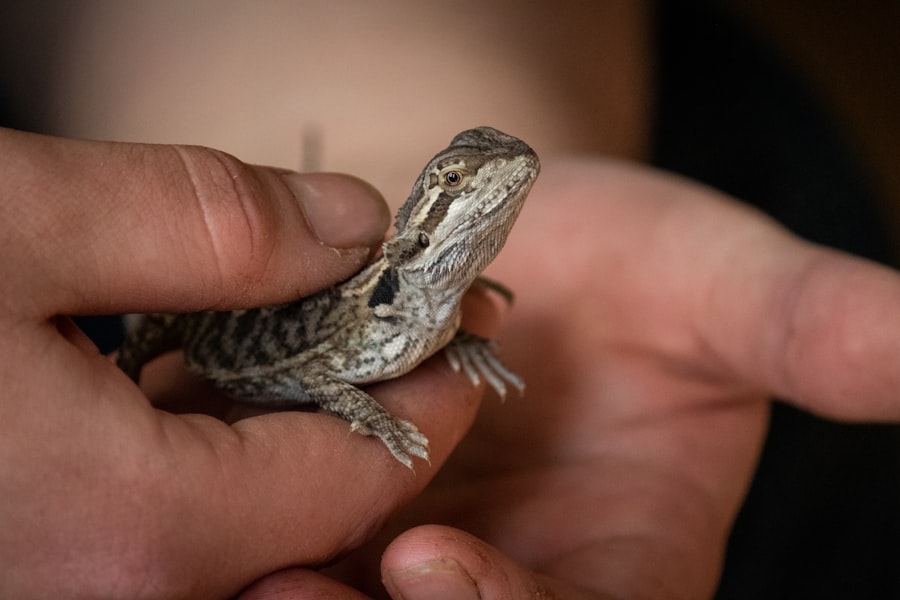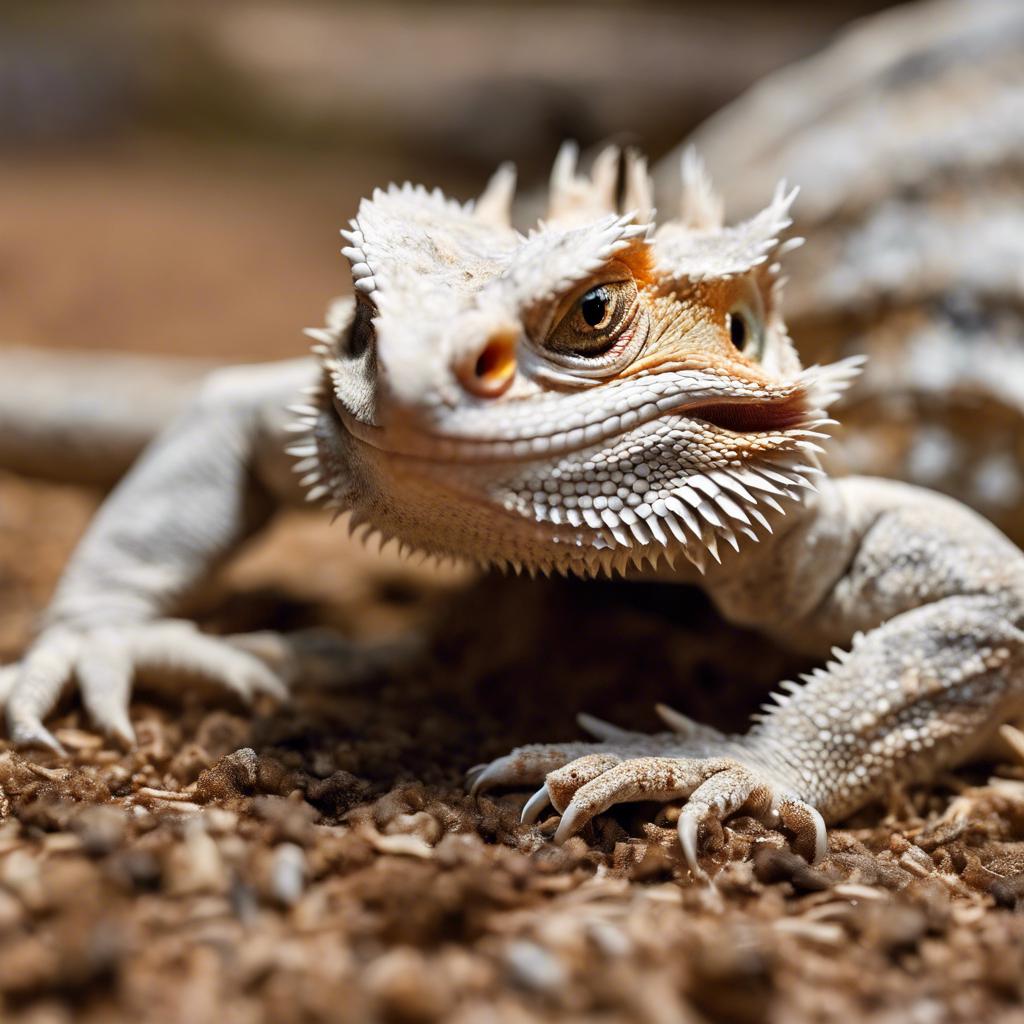Shedding is a natural process that all bearded dragons go through as they grow. It is a necessary part of their development and allows them to replace old, worn-out skin with new, healthy skin. Shedding can be a fascinating process to observe, but it can also come with some challenges, particularly when it comes to their appetite and behavior. In this article, we will explore the shedding process in bearded dragons, how it affects their eating habits, and what you can do to support them during this time.
Key Takeaways
- Bearded dragons shed their skin regularly as they grow.
- Shedding can cause a decrease in appetite, but it varies from dragon to dragon.
- Changes in behavior, such as lethargy or irritability, can occur during shedding.
- Factors like temperature and hydration can affect a dragon's eating habits during shedding.
- To encourage eating, offer soft and moist foods and ensure proper hydration.
Understanding the Shedding Process in Bearded Dragons
The shedding process in bearded dragons occurs in stages. It begins with the appearance of small white patches on their skin, which indicate that the shedding process is about to begin. As the shedding progresses, these patches will become larger and more noticeable. Eventually, the old skin will start to peel away, revealing the new skin underneath.
The frequency of shedding varies among bearded dragons and can depend on factors such as age, diet, and overall health. Younger dragons tend to shed more frequently than older ones, as they are growing at a faster rate. On average, bearded dragons shed every 4-6 weeks. However, this can vary from dragon to dragon.
Do Bearded Dragons Eat Less During Shedding?
Yes, it is common for bearded dragons to eat less during the shedding process. This is because shedding can be an uncomfortable and sometimes painful process for them. The old skin can become tight and itchy, making it difficult for them to move and eat comfortably.
During shedding, bearded dragons may also experience a decrease in appetite due to hormonal changes in their body. These changes can affect their metabolism and digestion, leading to a decrease in hunger.
The Impact of Shedding on Bearded Dragon Appetite
Shedding can have a significant impact on a bearded dragon's appetite. It is important to monitor their eating habits during this time to ensure they are still getting the nutrition they need.
If you notice that your bearded dragon is eating less during shedding, it is essential to provide them with alternative food options that are easy to eat and digest. Offer softer foods such as mashed vegetables or baby food, as these can be easier for them to consume during this time. It is also important to make sure they have access to fresh water at all times, as hydration is crucial for their overall health.
Shedding and Changes in Bearded Dragon Behavior
Shedding can also cause changes in a bearded dragon's behavior. They may become more irritable or agitated during this time, as the discomfort of shedding can make them feel more vulnerable. They may also become less active and spend more time hiding or basking to alleviate the discomfort.
It is important to be patient and understanding during this time, as your bearded dragon may not be as social or interactive as usual. Avoid handling them too much during shedding, as this can cause additional stress and discomfort.
Factors that Affect Bearded Dragon Eating During Shedding

Several factors can affect a bearded dragon's eating habits during shedding. One of the most significant factors is temperature and humidity levels in their enclosure. Bearded dragons require specific temperature and humidity ranges to maintain their health and appetite. If these levels are not optimal, it can affect their ability to eat and digest food properly.
Stress and anxiety can also impact a bearded dragon's eating habits during shedding. Changes in their environment, such as moving to a new enclosure or introducing new tank mates, can cause stress and disrupt their eating patterns.
How to Encourage Bearded Dragons to Eat During Shedding
To encourage your bearded dragon to eat during shedding, it is important to offer a variety of foods that are easy to eat and digest. Soft vegetables, such as squash or sweet potatoes, can be mashed or pureed to make them easier for your dragon to consume. You can also try offering small, bite-sized pieces of fruits or insects to entice them to eat.
It is crucial to make sure your bearded dragon has access to fresh water at all times. Hydration is essential for their overall health and can help alleviate some of the discomfort associated with shedding.
Nutritional Needs of Bearded Dragons During Shedding
During shedding, it is important to ensure that your bearded dragon is receiving a balanced diet that meets their nutritional needs. A diet rich in calcium and vitamin D is essential for healthy skin and shedding. Offer a variety of vegetables, such as collard greens, kale, and bell peppers, to provide them with the necessary vitamins and minerals.
Avoid feeding your bearded dragon foods that are high in phosphorus, as this can interfere with calcium absorption. Foods to avoid during shedding include spinach, rhubarb, and beet greens.
Common Mistakes to Avoid When Feeding Bearded Dragons During Shedding
When feeding your bearded dragon during shedding, there are a few common mistakes to avoid. One of the most common mistakes is overfeeding. While it may be tempting to offer extra food during shedding, overfeeding can lead to obesity and other health issues.
Another mistake to avoid is feeding the wrong foods. Some foods, such as citrus fruits or onions, can be harmful to bearded dragons and should be avoided altogether. It is important to do your research and ensure that you are offering safe and nutritious foods during shedding.
When to Seek Veterinary Care for Bearded Dragons During Shedding
In most cases, shedding is a natural process that does not require veterinary intervention. However, there are some instances where you may need to seek veterinary care for your bearded dragon during shedding.
If you notice any signs of shedding complications, such as excessive bleeding, difficulty shedding, or skin infections, it is important to contact a veterinarian. These can be signs of underlying health issues that need to be addressed.
Helping Your Bearded Dragon Through the Shedding Process
Shedding is a natural process for bearded dragons, but it can come with some challenges. By understanding the shedding process and its impact on their appetite and behavior, you can better support your bearded dragon during this time. Remember to provide them with a variety of easy-to-eat foods, ensure they have access to fresh water, and monitor their eating habits closely. With patience and care, you can help your bearded dragon through the shedding process and ensure their overall health and well-being.
If you're curious about the eating habits of bearded dragons during shedding, you might find this article on Reptile Wizard quite interesting. It explores the topic of whether bearded dragons eat less when shedding and provides valuable insights into their behavior during this period. To learn more, check out the article here. While you're at it, don't forget to explore Reptile Wizard's website for more informative articles on reptile keeping, such as can bearded dragons eat black beans?
FAQs
What is shedding in bearded dragons?
Shedding is a natural process in which bearded dragons shed their old skin to make way for new growth.
Do bearded dragons eat less when shedding?
Yes, bearded dragons may eat less or refuse to eat altogether during shedding. This is because shedding can be uncomfortable and may cause loss of appetite.
Is it normal for bearded dragons to eat less during shedding?
Yes, it is normal for bearded dragons to eat less during shedding. However, if they refuse to eat for an extended period of time, it is important to consult a veterinarian.
What should I do if my bearded dragon is not eating during shedding?
If your bearded dragon is not eating during shedding, make sure to provide plenty of fresh water and offer a variety of foods. If they continue to refuse to eat, consult a veterinarian.
Can I help my bearded dragon during shedding?
Yes, you can help your bearded dragon during shedding by providing a humid environment and gently rubbing their skin to help remove any loose skin. However, be careful not to pull off any skin that is not ready to come off.

